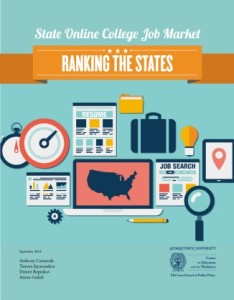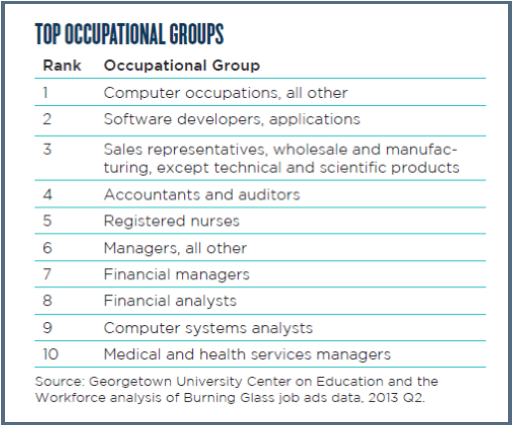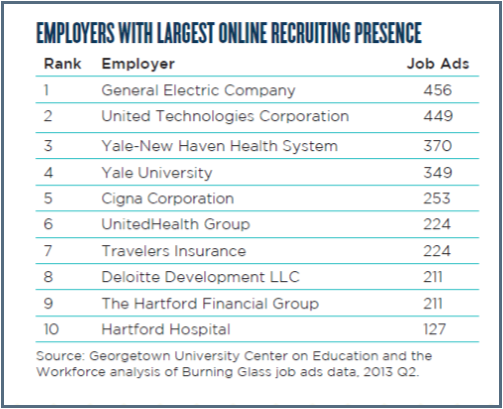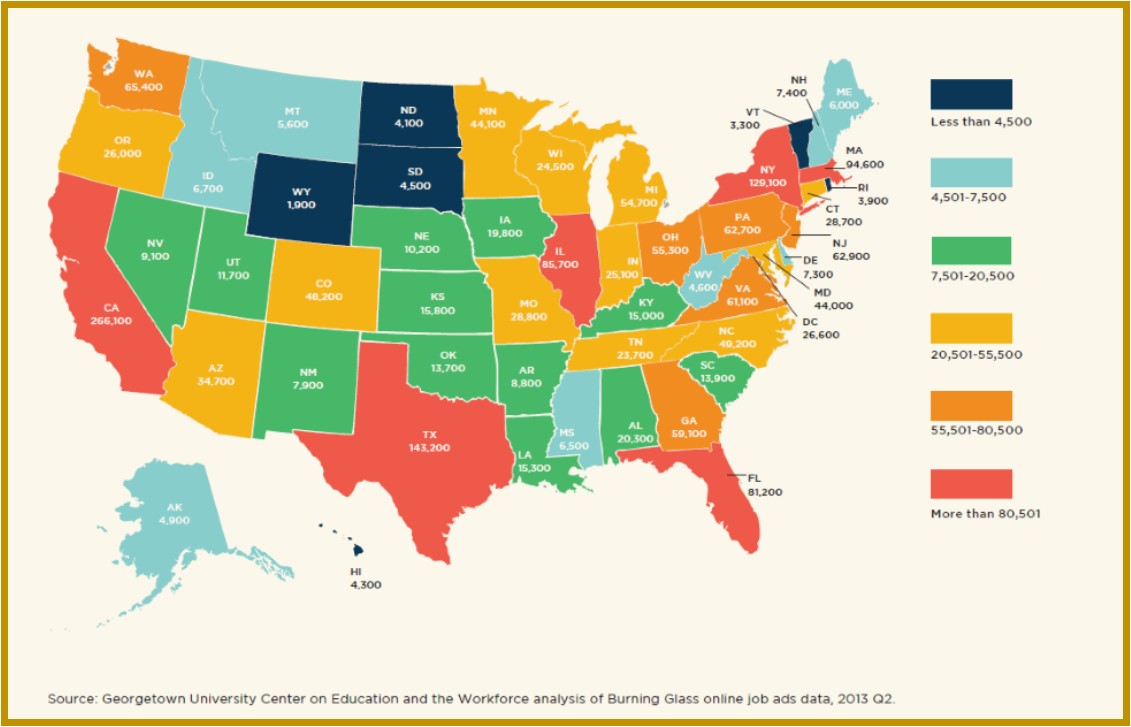Connecticut Ranks #16, Above National Average in Online Job Ads for College Graduates
/Connecticut ranks as the 16th best online college labor market in the U.S., according to data compiled by the Georgetown University Center on Education and the Workforce. In Connecticut, 53 percent of online job ads seek college graduates. That translates to 28,700 online job ads, and places Connecticut – just barely – in the top tier of the states.
Massachusetts provides college graduates with the best odds of landing a job, according to the national survey. Using online job ads, the report provides information about where the jobs are for college graduates for each of the 50 states to help students, educators, and policymakers make better decisions.
The report ranks the states by how many job openings there are per college-educated worker overall and within industries and career fields. College graduates seeking work in science, technology, engineering, and mathematics (STEM) careers, for example, have the best odds in Delaware, Massachusetts, and New York. Connecticut is in the middle of the pack.
Nationwide, between 60 and 70 percent of job openings are advertised online, and even though only 35 percent of workers have college degrees, nearly half of online job ads cater to college graduates. The top five best online markets for college graduates are Massachusetts, Delaware, Washington, Colorado, and Alaska.
The survey found that in Connecticut:
- 36% of online job adds for college graduates are for managerial and professional office occupations
- 22% of online job ads are in the consulting and business services sector
- The fastest growing occupational cluster for college graduates is in food and personal service, growing by 73 percent between the 1st quarter of 2010 and 2nd quarter of 2013
- The fastest growing industry sector of college graduates is construction, with a 92 percent increase in employment between the 1st quarter of 2010 and 2nd quarter of 2013
 The top occupational groups reflected in the online job ads were 1) computer occupations, 2) software developers, 3) sales representatives,4) accountants and auditors, 5) registered nurses, 6) managers, 7) financial managers, 8) financial analysts, 9) computer system analysts and 10) medical and health services managers.
The top occupational groups reflected in the online job ads were 1) computer occupations, 2) software developers, 3) sales representatives,4) accountants and auditors, 5) registered nurses, 6) managers, 7) financial managers, 8) financial analysts, 9) computer system analysts and 10) medical and health services managers.
The distribution of online college job ads by occupational cluster shows that the largest percentage (24%) are in managerial and professional office occupations, followed by sales and office support (23%), STEM fields of science, technology, engineering and math (15%) and blue collar jobs (9%).
Connecticut employers with the largest online recruiting presence were General Electric Company, United Technologies Corporation, Yale-New Haven Health System, Yale University, Cigna Corporation, UnitedHealth Group, Travelers Insurance, Deloitte Development, The Hartford Financial Group, and Hartford Healthcare.
Across the country, college-educated workers will have the best odds of finding a job in STEM, managerial and professional office, and healthcare professional and technical occupations. The jobs of the new economy are prevalent for college graduates across the 50 states. Employers in information services, consulting and business services and financial services sectors post the most online job ads per college-educated worker.
 The Georgetown University Center on Education and the Workplace is affiliated with the McCourt School of Public Policy. The study was done by Anthony Carnevale, Tamara Jayasundera, Dmitrirepnikov and Artem Gulish.
The Georgetown University Center on Education and the Workplace is affiliated with the McCourt School of Public Policy. The study was done by Anthony Carnevale, Tamara Jayasundera, Dmitrirepnikov and Artem Gulish.
“The promise of this information is the ability to connect real people with real jobs in real time,” said Anthony P. Carnevale, the report’s lead author and director of the Center. “By combining information on online job ads with traditional employment data we are able to get a more complete picture of job opportunities available to college graduates in each state,” said Tamara Jayasundera, the report’s co-author.
In Massachusetts, 63 percent of job openings are for college graduates, while in West Virginia, only 36 percent of job openings are for college graduates.

































